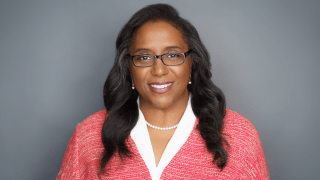Professor of Education and the Robert H. Naslund Chair in Curriculum and Teaching, Jessica DeCuir-Gunby has been elected as the new president of the American Psychological Association’s Educational Psychology Division. In the new role, DeCuir-Gunby will oversee all division business including presiding over meetings, setting an annual organizational theme, inviting speakers to and designating sessions for the annual APA convention, as well as focusing on three key initiatives.
The APA is the preeminent professional and scientific organization in the United States dedicated to advancing the wide and varied disciplines within the field of psychology. The organization publishes over 90 peer-reviewed journals, maintains essential scholarly databases, educates the general public about key issues in mental health, and advocates for various federal policies and legislation, among many other activities. The organization has 54 divisions, including one dedicated to educational psychology, Division 15, which serves as a hub for professionals in a range of fields.
The Educational Psychology division which DeCuir-Gunby leads aims to “expand psychological knowledge and theory relevant to education, extend the application of psychological knowledge and services to all aspects of education, develop professional opportunities in educational psychology [and] further the development of psychological theory.”
Presidential candidates for the Educational Psychology Division are first selected by the division’s Nomination Committee. The president is then decided upon by popular vote by the division’s membership. Presidents, DeCuir-Gunby explains, “serve in a three-year presidential line—president-elect, president and past-president to maintain continuity and organizational history.”
DeCuir-Gunby is a leading scholar in the field of educational psychology, and her research focuses on the impact of race and racism on the educational experiences of African Americans, critical race theory, mixed methods research, as well as emotions and coping related to racism. Currently a fellow at both the APA and the American Educational Research Association, she has also long been a leader. She’s served in various leadership roles since she was an undergraduate student at Louisiana State University. Within academia, she’s served as a department head, and she’s also held leadership positions at other professional organizations. In 2019, she was named as the inaugural chair of the Educational Psychology Division’s Race and Diversity Committee, a committee she helped create.
During her term, DeCuir-Gunby will “build upon the accomplishments of the past president who focused on rehumanizing educational psychology to address past harm and focus on doing good, especially when working with marginalized populations,” as well as three of her own initiatives. She aims to expand the division’s membership by “focusing on recruitment of graduate students and members from marginalized groups” and devise ways to “improve the integration of DEI in the division and the field.” Third on DeCuir-Gunby’s list is to help the field “better connect research to practice, policy and/or advocacy,” citing what she sees as an urgent need in the field to better translate educational psychology research for those on the ground: practitioners, parents and policymakers, she says.
“In this new role, Jessica DeCuir-Gunby will continue her impressive work as a leader in the field of educational psychology. At USC Rossier, we are proud to support her as she works toward her vital and timely goals as president of the APA’s Educational Psychology Division,” says USC Rossier Dean Pedro Noguera.
As DeCuir-Gunby looks beyond the immediate year in front of her and to the future of educational psychology, she says that DEI will continue to be a major focus of the field, “particularly issues regarding race and racism.” She also notes the rise in artificial intelligence and its increasing impact on how we teach, learn and conduct research. Citing the growing population shifts across the globe due to climate change, war and political upheaval, DeCuir-Gunby says that “it’s imperative for the field to focus on the impact of globalization and immigration on schools, student development, school policy, teaching and learning.”





